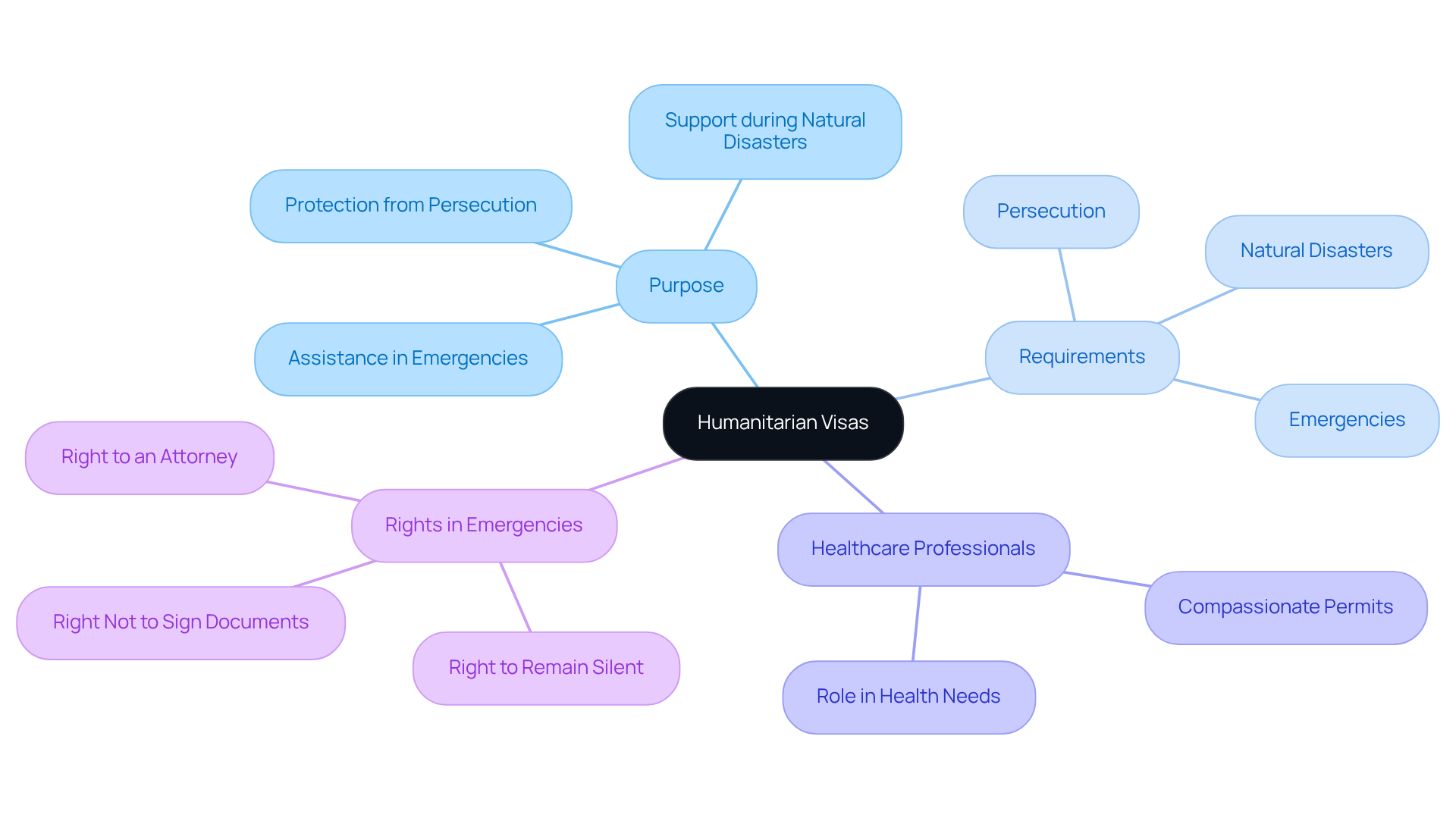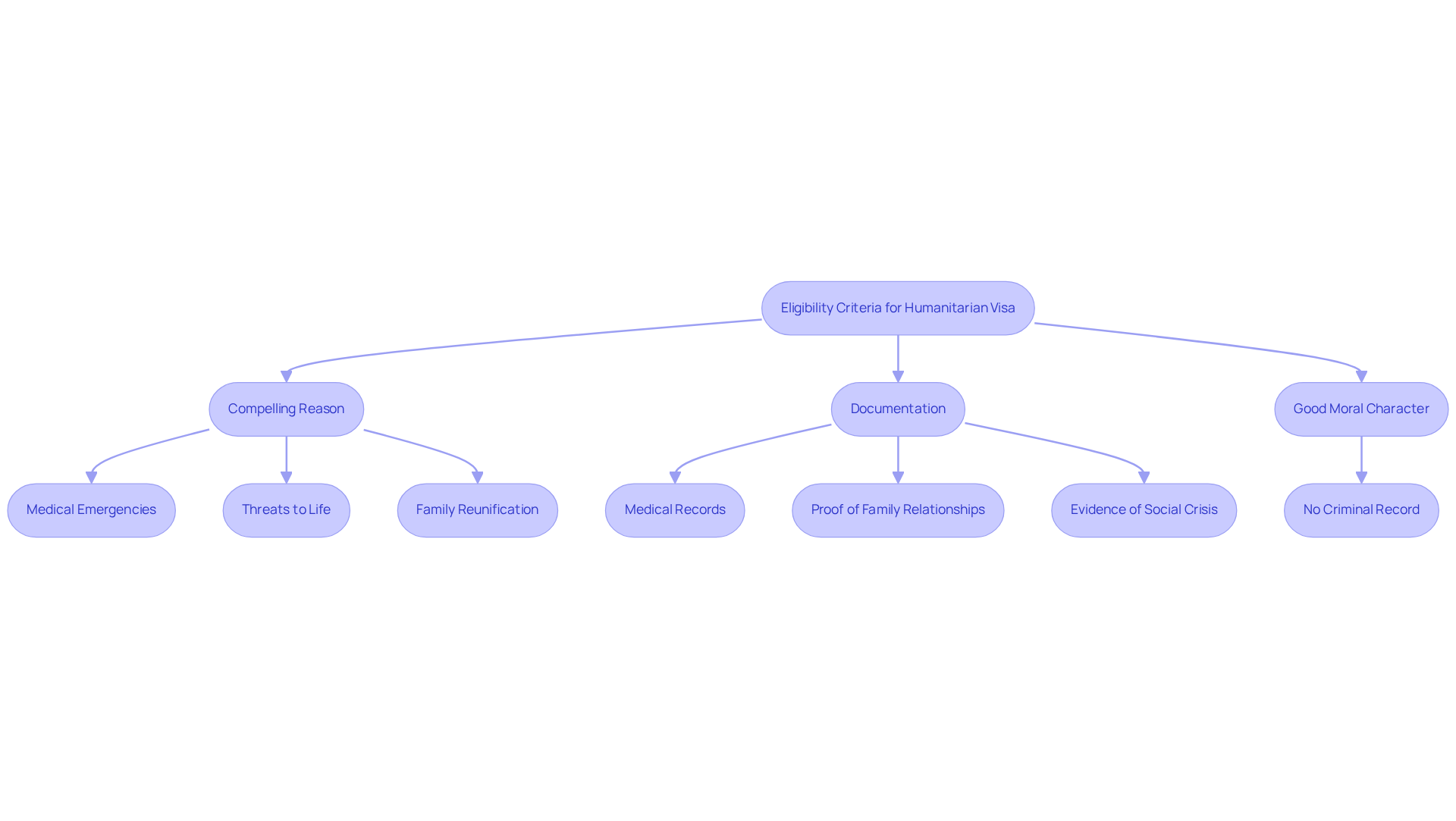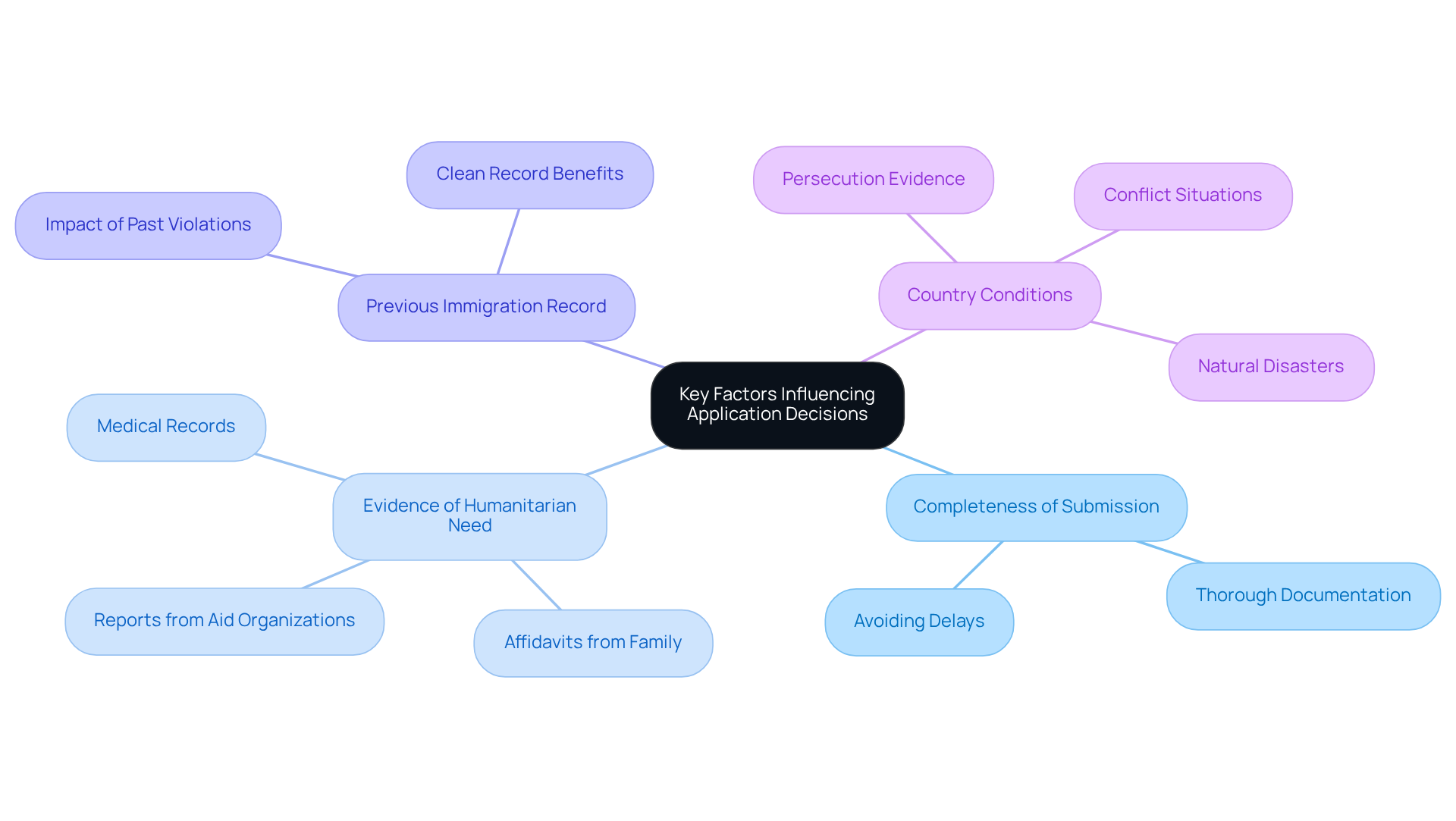Introduction
Humanitarian visas are a lifeline for those in dire situations, offering a crucial pathway to safety and support in foreign lands. Have you ever felt overwhelmed by the immigration process? For immigrant healthcare workers, grasping the intricate requirements and eligibility criteria for these permits is essential. It can significantly impact their ability to provide care and assistance during critical times.
Navigating the complexities of humanitarian visa applications raises pressing questions:
- What specific factors influence approval?
- How can applicants effectively demonstrate their urgent need for assistance?
We understand how overwhelming this feels. This article delves into the nuances of humanitarian visa requirements, equipping healthcare professionals with the knowledge they need to advocate for themselves and their families in times of crisis. Remember, you’re not alone in this fight-we’re here to support you.
Define Humanitarian Visas and Their Purpose
Humanitarian visa requirements are specialized permits created for individuals facing severe situations such as persecution, natural disasters, or emergencies. These permits are issued under humanitarian visa requirements, allowing people to enter a country temporarily or permanently to seek safety and support. For immigrant healthcare professionals, compassionate permits can be a vital pathway for those needing immediate medical assistance or serving as caregivers for sick relatives. The primary goal of the humanitarian visa requirements is to uphold global commitments to protect individuals who cannot safely return to their home countries due to threats to their life or liberty. Understanding the humanitarian visa requirements is crucial for healthcare professionals who may qualify for permits based on specific compassionate grounds.
In 2025, the number of assistance permits granted to healthcare professionals reflects a growing recognition of their essential role in addressing urgent health needs. Many successful applications highlight the significance of these provisions. Recent changes in immigration policy further underscore the commitment to helping those in distress, ensuring that compassionate permits remain a critical resource for individuals seeking refuge and safety.
If you find yourself in an immigration emergency, it’s vital to know your rights:
- you have the right to remain silent,
- the right to an attorney,
- and the right not to sign documents without legal counsel.
In situations like ICE enforcement actions or deportation proceedings, immediate action is necessary. Exercise your right to remain silent and request an attorney right away. At Vasquez Law Firm, we are committed to providing compassionate legal representation and advocacy for our clients, ensuring that language is never a barrier to justice.

Identify Eligibility Criteria for Humanitarian Visa Applicants
To qualify for a compassionate permit, applicants face specific requirements that can feel overwhelming. Urgent humanitarian visa requirements state that you need to show a compelling reason for your request - consider medical emergencies, threats to your life, or family reunification. Did you know that around 70% of aid visa applications get approved based on urgent needs? This highlights just how crucial it is to clearly express your circumstances.
-
Documentation: You’ll need supporting documents, like medical records, proof of family relationships, and evidence of the social crisis. Immigration attorneys stress that thorough documentation can make a significant difference in the approval process. As one attorney put it, "Providing comprehensive evidence is crucial for a successful application."
-
Good Moral Character: It’s essential to have a clean legal history - no criminal record that could make you inadmissible. This requirement underscores the importance of maintaining good moral character.
-
Application Process: You must submit the necessary forms, such as Form I-131 for compassionate parole, along with a detailed statement explaining your situation. Successful cases often include thorough narratives that effectively communicate your pressing need. For example, a recent case involved a healthcare professional who demonstrated their urgent need for a compassionate permit due to a family medical crisis, leading to a successful request.
Understanding these standards is vital for healthcare professionals looking to enter the U.S. on compassionate grounds. It can ease the process and significantly enhance your chances of acceptance. Remember, you’re not alone in this fight - we’re here to support you every step of the way.

Examine Key Factors Influencing Application Decisions
Navigating humanitarian visa requirements can feel overwhelming. But understanding a few key factors can make a world of difference in your journey.
-
Completeness of Submission: It’s crucial to submit a complete application with all required documents. Incomplete submissions often lead to delays or denials. So, take the time to ensure everything is thorough and accurate.
-
Evidence of Humanitarian Need: You’ll need to provide strong proof that shows why you urgently need assistance. This could be medical records, affidavits from family, or reports from recognized aid organizations. The stronger your evidence, the better your chances of approval.
-
Previous Immigration Record: Your immigration history matters. If you have a clean record, it boosts your credibility and increases the likelihood of a positive outcome. Any past violations can weigh heavily on your application.
-
Country Conditions: The situation in your home country plays a vital role in the decision-making process. Are there conflicts, persecution, or natural disasters? Demonstrating how these conditions impact your safety and well-being can be pivotal in securing that humanitarian visa.
By understanding the humanitarian visa requirements, you can prepare more effectively. Make sure your application is not just complete but also compelling and well-supported. Remember, you’re not alone in this fight-we’re here to support you every step of the way.

Conclusion
Understanding humanitarian visa requirements is crucial for immigrant healthcare workers seeking refuge and safety in a new country. These specialized permits act as a lifeline for individuals facing dire circumstances, allowing them to enter a nation to seek safety and support. This article highlights the importance of these visas, especially for healthcare professionals who play a vital role in addressing urgent health needs and navigating complex immigration processes.
Have you ever felt lost in the immigration process? Key insights emphasize the eligibility criteria for humanitarian visas, including the necessity of compelling documentation, good moral character, and a thorough understanding of the application process. Factors such as the completeness of submissions, evidence of humanitarian need, and country conditions significantly influence application outcomes. By being well-informed and prepared, healthcare workers can enhance their chances of successfully obtaining a humanitarian visa.
It’s important to know you have rights, even if others tell you otherwise. Ultimately, the significance of humanitarian visas extends beyond individual cases; they represent a commitment to protecting those in need and acknowledging the vital contributions of healthcare professionals. As the landscape of immigration continues to evolve, staying informed about current humanitarian visa policies and understanding how to navigate the application process can empower healthcare workers to seek the safety and stability they deserve. We’re here to fight for your family.
Frequently Asked Questions
What are humanitarian visas?
Humanitarian visas are specialized permits for individuals facing severe situations such as persecution, natural disasters, or emergencies, allowing them to enter a country temporarily or permanently to seek safety and support.
Who can benefit from humanitarian visas?
Individuals facing threats to their life or liberty, including immigrant healthcare professionals needing medical assistance or serving as caregivers for sick relatives, can benefit from humanitarian visas.
What is the primary goal of humanitarian visa requirements?
The primary goal is to uphold global commitments to protect individuals who cannot safely return to their home countries due to threats to their life or liberty.
Why is understanding humanitarian visa requirements important for healthcare professionals?
It is crucial for healthcare professionals to understand these requirements as they may qualify for permits based on specific compassionate grounds.
What recent trends have been observed regarding humanitarian visas for healthcare professionals?
In 2025, there was a growing recognition of the essential role of healthcare professionals, reflected in an increase in assistance permits granted to them for addressing urgent health needs.
What rights do individuals have in immigration emergencies?
Individuals have the right to remain silent, the right to an attorney, and the right not to sign documents without legal counsel.
What should someone do during ICE enforcement actions or deportation proceedings?
They should exercise their right to remain silent and request an attorney immediately.
How does Vasquez Law Firm support clients in immigration matters?
Vasquez Law Firm provides compassionate legal representation and advocacy, ensuring that language is never a barrier to justice for their clients.




